Why Star Trek: The Next Generation Ended After Seven Seasons
The final episode of "Star Trek: The Next Generation," called "All Good Things...," aired on May 23, 1994, although many Trekkies weren't entirely heartbroken. While viewers would no longer be able to see the weekly adventures of the Enterprise-D and its stalwart crew, they all knew that the spinoff feature film, "Star Trek: Generations" was due in theaters in only six months. Additionally, "Star Trek: Deep Space Nine" was already chugging along into its third season, and "Star Trek: Voyager" was actively developing. I tell ya, the 1990s was a grand time to be a Trekkie.
Of course, at the time, many fans wondered why "Next Generation" felt the need to stop after only seven seasons. Ratings were high, and the show hadn't waned in cultural popularity. The cast had even signed on to act in an eighth season, steeled to withstand another year in space. There was every reason to assume that "Next Generation" would continue indefinitely, or at least until audiences stopped paying attention.
The fact of the matter was, though, that the series was getting too expensive to produce. The core seven cast members (Gates McFadden, Patrick Stewart, Michael Dorn, LeVar Burton, Marina Sirtis, Brent Spiner, and Jonathan Frakes) were fetching higher and higher salaries, and the show's producers knew that they had to keep pushing the limits of TV special effects to keep audiences engaged with a galaxy-spanning space opera. And there were other, more technical costs to consider; it seems that Paramount was about to have a tough time selling "Next Generation" to local TV stations.
This was all detailed in a July 1994 article in the New York Times. Not only was the price tag on "Next Generation" getting too high, but the show's unusual distribution model was getting less and less tenable. Rather than keep pushing into the frontier of unbalanced accounting sheets, the studio ended the series while it was still riding high.
Star Trek: The Next Generation was too expensive and was about to get too difficult to sell
For most of its history, "Star Trek" has engaged in unusual distribution patterns. The original series was broadcast on NBC, but didn't become a cultural phenomenon until it was sold into syndication; it was only in reruns that the series became the phenomenon that it did. "Next Generation," meanwhile, was sold directly to local TV stations, rather than linking itself to a single network (Paramount didn't try to launch its own TV network in earnest until 1995). In order to buy "Next Generation," a local station was required to rerun every single episode at least seven times, which allowed for a glut of "Next Generation" reruns; there was a time when one could see both "Star Trek" and "Next Generation" on a daily basis.
Of course, with seven seasons and 278 episodes, promising to rerun each one seven times caused some concern. What station would want to commit to buying 1,946 hours of TV? Would viewers remain interested in seven full go-throughs of a single series? It was a time commitment that Paramount knew it would have trouble selling. Also, spending trends in 1994 dictated that newer episodes fetch lower prices than early ones, not higher. This meant Paramount would, overall, earn less selling "Next Generation," right when it was costing more and more to make (thanks to those increasing salaries and SFX budgets).
Overall, it just wasn't economically feasible. In short, "Next Generation" ended because there was already too much of it. It wouldn't be until much later that "Star Trek's" movie and TV rights would be split between two companies, complicating things further.
The cast didn't know why Next Generation was being canceled
According to a 1994 article in EW, the cast wasn't told any of the above information. They only heard stories of their show's high ratings and knew that they were contracted for an eighth season. When Paramount said they were canceling the show, no one was able to give the cast a solid reason as to why. They certainly weren't told the labyrinthine details of local TV distribution contracts. A movie, of course, had been planned, but actor Jonathan Frakes didn't see any reason why a movie couldn't have been delayed an additional year. He expressed his frustration thus:
"I haven't been given any reason that holds water. [...] Maybe [Paramount] thought they couldn't do the movie and the TV show at the same time-although I don't know why the movie had to be made this year. Some of us kept hoping there would be an eleventh-hour reprieve, that Paramount would realize how much money the show has made for them and change their minds."
According to "Star Trek" executive producer Rick Berman, the decision to end "Next Generation" after seven years was all Paramount's doing. It was decided even before "Star Trek: Voyager" was pitched. The writers, while perhaps feeling a little burnt out, were still on board, and the cast all seemed to be game (although Spiner was quoted in the EW article as being somewhat dispassionate). But, like all things, it came down to money. The EW article also quoted Paramount executive Joel Berman (no relation), and he noted that a film franchise would be more profitable than a TV franchise.
Of course, the cancelation of "Next Generation" after seven years set the template. Both "Deep Space Nine" and "Voyager" lasted seven years, and 2001's "Star Trek: Enterprise" would have followed suit if it hadn't been canned after only four. And now, in the streaming era, services can buy up whole shows without having to commit to seven reruns, changing the rules entirely. Of course, even with the new rules, "Star Trek" remained ubiquitous.


